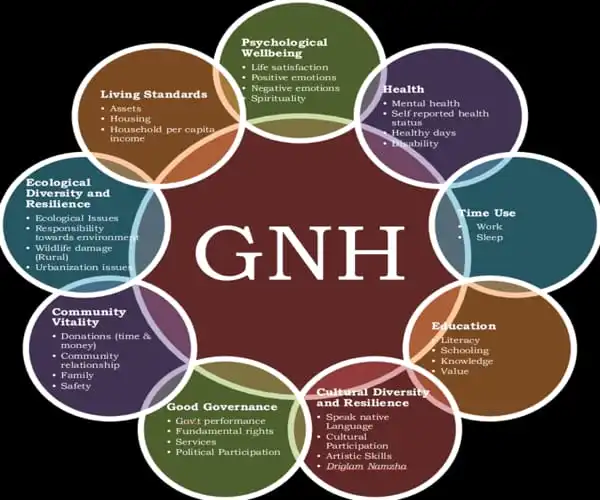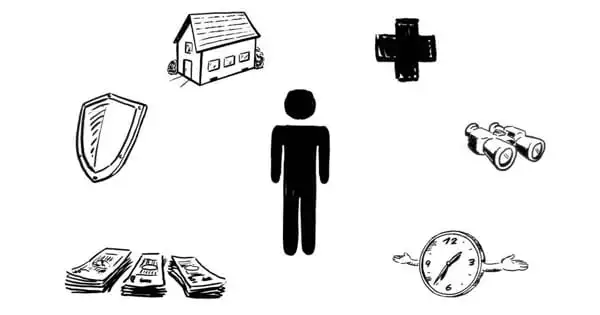Bhutan’s government is guided by the Gross National Happiness (GNH) philosophy. It is a measure of economic and moral progress, introduced by the king of the Himalayan country of Bhutan in the 1970s as an alternative to GDP. It includes an index that is used to assess a population’s overall happiness and well-being. Rather than focusing solely on quantitative economic measures, gross national happiness considers a diverse set of quality-of-life factors.
The four pillars of GNH have frequently been used to explain the concept: good governance, sustainable socio-economic development, cultural preservation, and environmental conservation. Recently, the four pillars have been subdivided into nine domains in order to promote a broader understanding of GNH and to reflect the full range of GNH values. Psychological well-being, health, education, time use, cultural diversity and resilience, good governance, community vitality, ecological diversity and resilience, and living standards are the nine domains.
In the Bhutanese Constitution, enacted on July 18, 2008, the Gross National Happiness Index is established as the government’s goal. The first legal code of the Kingdom of Bhutan, written at the time of unification in 1729, stated that “if the government cannot create happiness for its people, there is no purpose for the government.”

History
In a 1972 interview with the Financial Times, King Jigme Singye Wangchuck stated that “gross national happiness is more important than the gross national product.” The advent and concept of “Gross National Happiness” (GNH) flourished and germinated in the mind of Compassionate Bodhisattva Druk Gyelpo, the 4th King of Bhutan, Jigme Singye Wangchuk, groomed with the evolution of “Gaki Phuensum” (Peace and Prosperity) and Bhutan’s Modernization period during the reign (1952 – 1972) of Druk Gyelpo, the It is unclear how seriously King Jigme took this new metric, but Bhutanese scholars have taken up the idea and run with it.
The 4th King of Bhutan, King Jigme Singye Wangchuck, conceptualized the term “Gross National Happiness” in 1972, declaring that “Gross National Happiness is more important than Gross Domestic Product.” The concept implies that sustainable development should take a holistic approach to progress and give equal weight to non-economic aspects of well-being.
The United Nations General Assembly passed Resolution “Happiness: Towards a Holistic Approach to Development” in 2011, urging member countries to follow Bhutan’s lead and measure happiness and well-being, and describing happiness as a “fundamental human goal.”
Bhutan’s Prime Minister Jigme Thinley and United Nations Secretary-General Ban Ki-Moon convened the High-Level Meeting: Well-being and Happiness: Defining a New Economic Paradigm in 2012 to encourage the spread of Bhutan’s GNH philosophy. The first World Happiness Report was released at the High-Level Meeting. Shortly after, the UN declared March 20th to be the International Day of Happiness in 2012 with Resolution 66/28.
Bhutan’s Prime Minister Tshering Tobgay declared his preference for focusing on more concrete goals rather than promoting GNH when he took office, but he has since protected his country’s GNH and promoted the concept internationally. Other Bhutanese officials advocate for the spread of GNH at the UN and on a global scale.
The GNH Index considers both traditional socioeconomic concerns such as living standards, health, and education, as well as less traditional concerns such as culture and psychological well-being. It is a holistic reflection of the Bhutanese population’s general well-being rather than a subjective psychological ranking of ‘happiness’ alone.
















